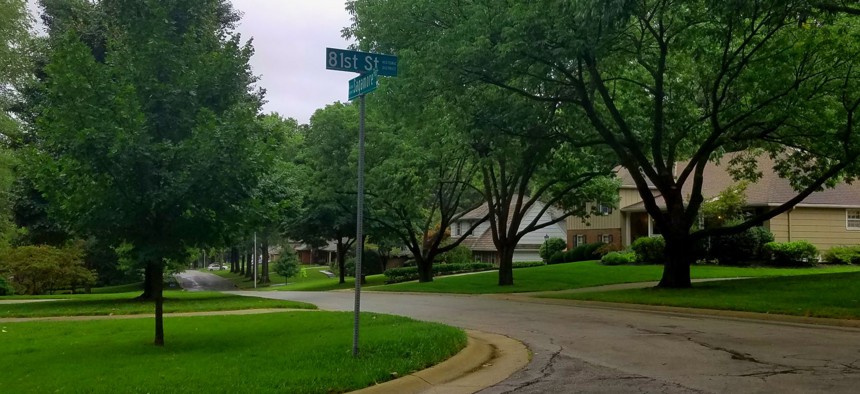Route Fifty Roadmap: Visiting a Kansas City Suburb Where Google Fiber Hit a Roadblock

Notice anything missing hanging over the leafy streets of Leawood, Kansas? Michael Grass / RouteFifty.com

Connecting state and local government leaders
Municipal rules about undergrounding utilities proved to be too great a challenge to overcome in Leawood, Kansas, back in 2014. Could new models to expand connectivity bridge those barriers?
Route Fifty Roadmap is an ongoing series of dispatches from the semi-regular travels of the Route Fifty staff around the United States. | PREVIOUSLY: Goat Haunt, Mont.
LEAWOOD, Kan. — Driving west across Stateline Road, there’s an easy way to tell you’ve left Kansas City, Missouri, and entered this well-off, leafy suburb on the Kansas side of the border. There aren’t many above-ground wires hanging from utility poles. The tree canopy arcs over many streets without much interruption.
That’s because the bulk of the public utilities in Leawood are buried or otherwise shielded from view with landscaping or set back from the front of properties. That gives properties more curb appeal and utility services that are more resilient to storm damage.
The big rule in this city of around 35,000 residents: “All facilities shall be placed underground unless otherwise authorized,” reads a Leawood development ordinance. “Aboveground pedestals, vaults, or other aboveground facilities may be installed only if approved by the City where alternative underground facilities are not reasonably feasible or where above-ground placement is otherwise authorized …”
Although Leawood officials had, back in April 2013, invited Google Fiber to bring its gigabit-speed internet to residents in the city, problems would develop.
As was reported in November 2014 by The Kansas City Star and other local media, Google Fiber pulled back from its expansion in Leawood due to difficulty with the municipal regulations on the placement of utilities.
“While we appreciate Leawood’s desire to direct all new infrastructure underground, the city’s prohibition on new market entrants using existing aerial infrastructure is a significant barrier to the construction of a new network,” reads a July 2014 letter from Google Fiber to Leawood’s city administrator informing the city that it would not move forward on expansion in the city obtained by KSHB-TV. “Building an entirely new fiber network is a major undertaking, and unnecessary underground construction—where there are already poles carrying other services above ground—wouldn’t be practical or efficient.”
AT&T announced that it would bring gigabit speed internet to Leawood soon after Google Fiber announced its intention to skip Leawood and continue to expand in neighboring suburban jurisdictions in Johnson County. That’s included places like Prairie Village, Mission, Fairway and Mission Hills, plus part of northern Overland Park, according to the Shawnee Mission Post. Google Fiber is currently available to customers in Merriam, Roeland Park, Westwood, Westwood Hills, and Mission Woods.
Google Fiber’s problems in Leawood were an earlier sign that it would need to look beyond installing fiber if it wanted to expand to more places and meet its ambitious vision to bring gigabit-speed internet connectivity to more localities across the U.S.
Google’s strategy on its gigabit expansion has recently shifted.
As The Information first reported in late August, Google’s parent, Alphabet Inc., ordered major cuts at its Google Fiber unit this summer, with Alphabet’s Larry Page and Sergey Brin “frustrated with mounting costs of delivering high-speed internet by digging up dirt,” as Recode described the situation.
Earlier this year, Google Fiber announced new partnerships in Huntsville, Alabama, and San Francisco as part of its expansion. But instead of building out a new fiber network, Google Fiber will be leasing pre-existing networks.
And on Monday, Google Fiber announced that it had finished its previously announced acquisition of Webpass, a wireless Internet service provider that “will figure prominently into its plans for deployment of high-speed Internet,” as Ars Technica reported.
That wireless approach will provide a new route for Google Fiber to expand its gigabit network by sidestepping hitting some of the expensive stumbling blocks or Leawood-type problems involved with rolling out new fiber connections.
PREVIOUSLY on Route Fifty:
Michael Grass is Executive Editor at Government Executive's Route Fifty and is based in Seattle.

NEXT STORY: GSA points the way to federated data





